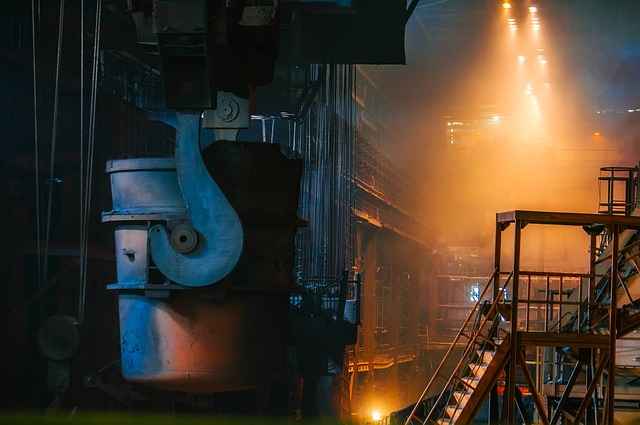
Steel manufacturing
Published on
Average Read time: 2 minutes 4 seconds
Steel manufacturing in Pakistan is a significant industry, contributing to the country's economy and infrastructure development. Here's an overview of the steel manufacturing process in Pakistan:
Raw Material Acquisition: The primary raw materials for steel manufacturing are iron ore, coal, and limestone. In Pakistan, iron ore is typically mined domestically or imported, while coal is often imported due to limited domestic production. Limestone, used as a fluxing agent, is available domestically.
Iron Making: In the iron-making process, iron ore is processed into pig iron through a series of steps such as sintering, pelletizing, and blast furnace smelting. In Pakistan, blast furnaces are commonly used for pig iron production.
Steel Making: The pig iron produced in the iron-making process is converted into steel through various methods such as basic oxygen furnace (BOF), electric arc furnace (EAF), or induction furnace. These processes involve refining the composition of the iron to achieve the desired properties of the steel.
Casting: Once the steel is produced, it is cast into various shapes and sizes. This can involve continuous casting, where molten steel is poured into molds to form long continuous shapes such as billets, blooms, or slabs. Alternatively, steel can be cast into ingots for further processing.
Rolling and Forming: After casting, the steel undergoes rolling processes to shape it into final products such as bars, rods, sheets, plates, or structural sections. Rolling mills in Pakistan use various types of rolling techniques, including hot rolling and cold rolling, depending on the desired properties of the steel products.
Finishing and Coating: Once the steel is formed into the desired shapes, it may undergo further finishing processes such as heat treatment, surface treatment, or coating to enhance its properties and appearance. This can include processes like galvanizing, coating with paints or coatings, or surface polishing.
Quality Control and Testing: Throughout the steel manufacturing process, rigorous quality control measures are implemented to ensure that the steel meets the required standards and specifications. This involves testing the chemical composition, mechanical properties, and dimensional accuracy of the steel products.
Distribution and Sales: Finally, the finished steel products are packaged and distributed to customers, including construction companies, manufacturers, and other industries. Steel manufacturers in Pakistan typically supply a wide range of products for various applications, including construction, automotive, infrastructure, and machinery.
Raw Material Acquisition: The primary raw materials for steel manufacturing are iron ore, coal, and limestone. In Pakistan, iron ore is typically mined domestically or imported, while coal is often imported due to limited domestic production. Limestone, used as a fluxing agent, is available domestically.
Iron Making: In the iron-making process, iron ore is processed into pig iron through a series of steps such as sintering, pelletizing, and blast furnace smelting. In Pakistan, blast furnaces are commonly used for pig iron production.
Steel Making: The pig iron produced in the iron-making process is converted into steel through various methods such as basic oxygen furnace (BOF), electric arc furnace (EAF), or induction furnace. These processes involve refining the composition of the iron to achieve the desired properties of the steel.
Casting: Once the steel is produced, it is cast into various shapes and sizes. This can involve continuous casting, where molten steel is poured into molds to form long continuous shapes such as billets, blooms, or slabs. Alternatively, steel can be cast into ingots for further processing.
Rolling and Forming: After casting, the steel undergoes rolling processes to shape it into final products such as bars, rods, sheets, plates, or structural sections. Rolling mills in Pakistan use various types of rolling techniques, including hot rolling and cold rolling, depending on the desired properties of the steel products.
Finishing and Coating: Once the steel is formed into the desired shapes, it may undergo further finishing processes such as heat treatment, surface treatment, or coating to enhance its properties and appearance. This can include processes like galvanizing, coating with paints or coatings, or surface polishing.
Quality Control and Testing: Throughout the steel manufacturing process, rigorous quality control measures are implemented to ensure that the steel meets the required standards and specifications. This involves testing the chemical composition, mechanical properties, and dimensional accuracy of the steel products.
Distribution and Sales: Finally, the finished steel products are packaged and distributed to customers, including construction companies, manufacturers, and other industries. Steel manufacturers in Pakistan typically supply a wide range of products for various applications, including construction, automotive, infrastructure, and machinery.
Some prominent steel manufacturers in Pakistan include Pakistan Steel Mills (PSM), Aisha Steel Mills Limited, Amreli Steels Limited, and International Steels Limited, among others. These companies play a crucial role in meeting the demand for steel in Pakistan and contributing to the country's industrial growth and development.